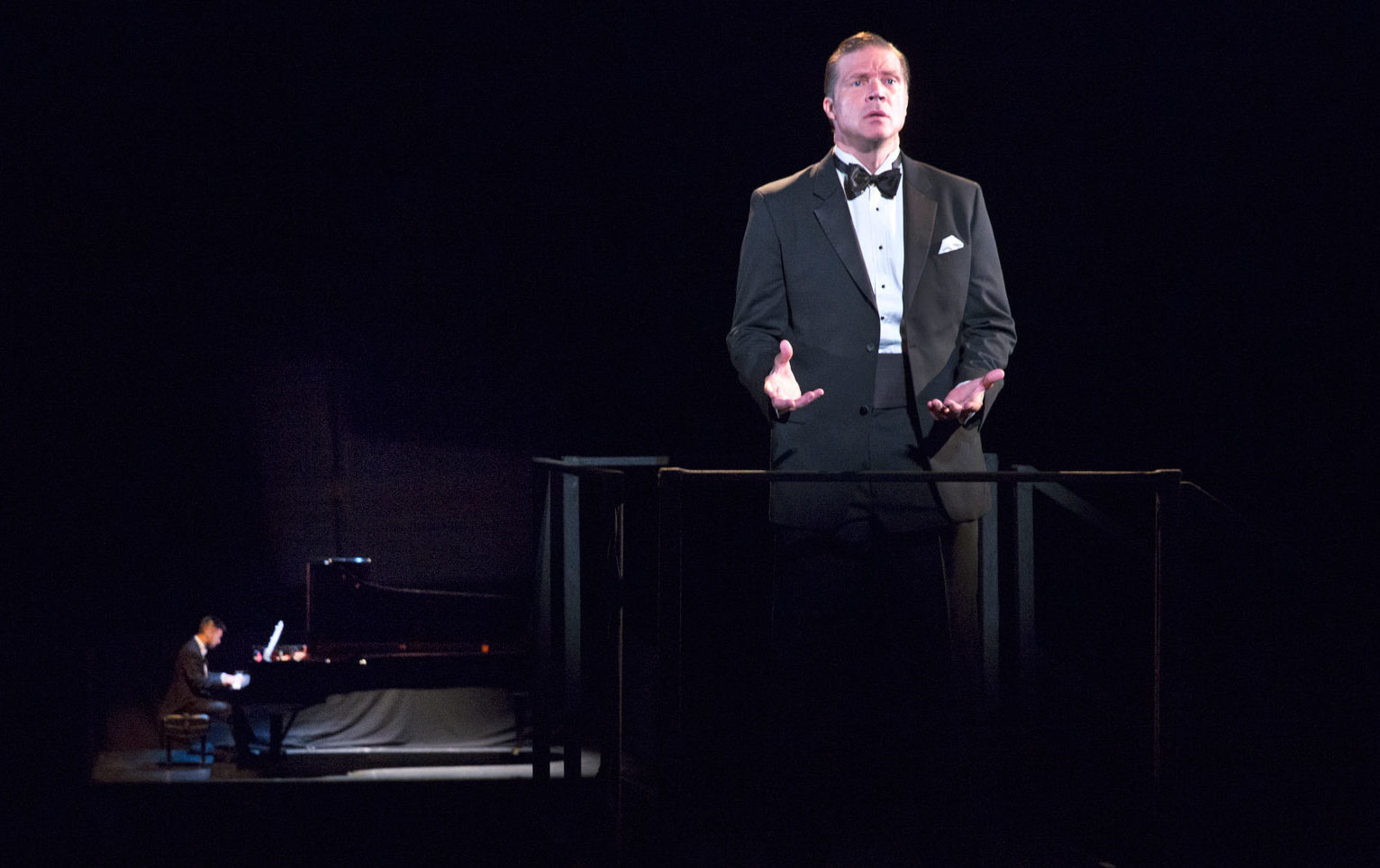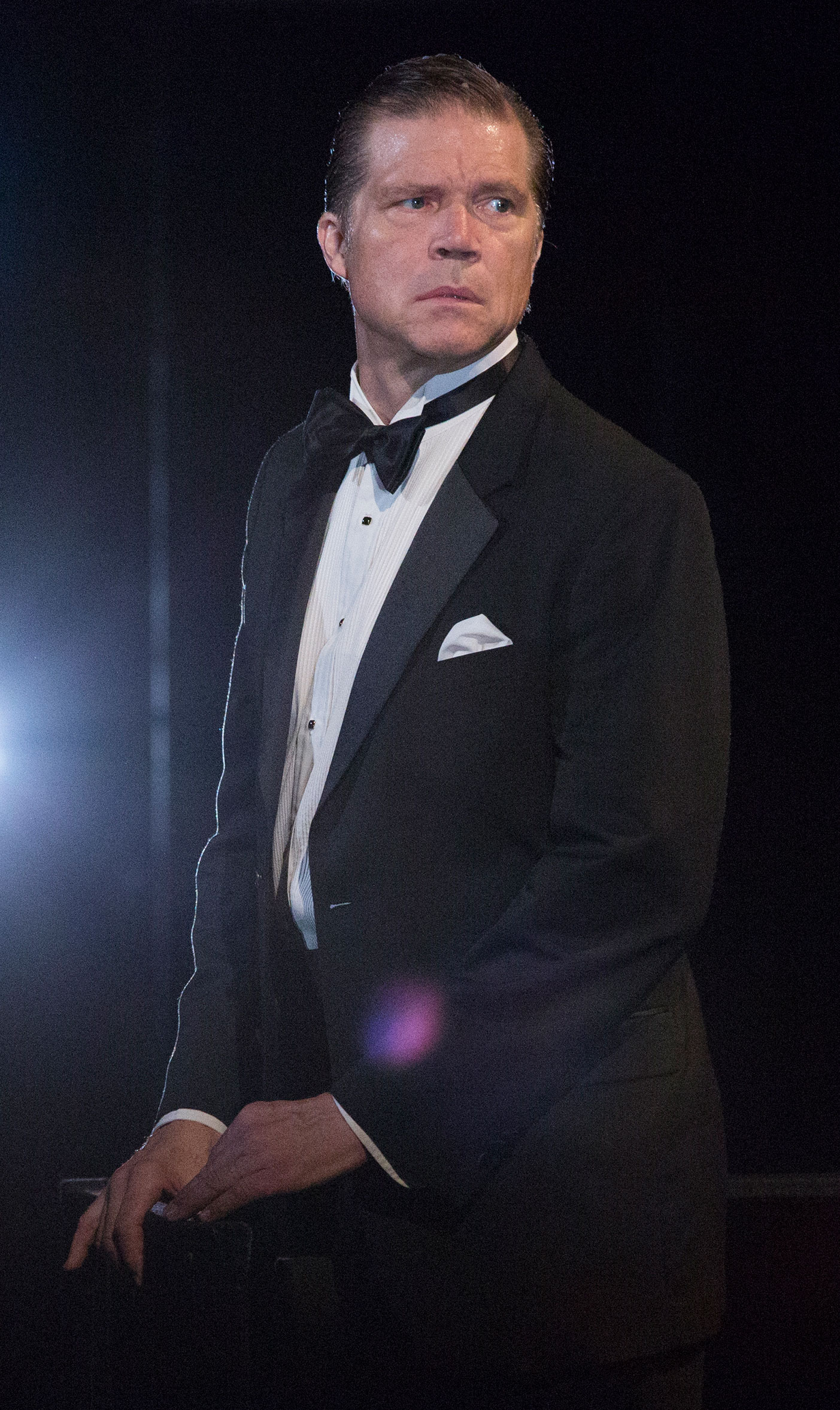The Loser, David Lang’s beautiful and startlingly original opera, had its world premiere this month at the Brooklyn Academy of Music. Composed for a solo baritone, a chamber ensemble, and a concert pianist, the opera (Lang not only wrote the music but is also responsible for the libretto and the stage direction) has been adapted from the Thomas Bernhard novel of the same name—a book which, since its publication in 1983, has attracted an almost cultish following.
Bernhard’s plot, such as it is, concerns three men who at one time were fellow students at the Mozarteum, a celebrated music academy in Salzburg. One of them was the legendary pianist Glenn Gould. (Bernhard takes a number of significant liberties with the facts of Gould’s biography and inserts autobiographical elements into his imagined version of Gould’s life; in reality, Gould never studied the piano with Horowitz in Austria, nor did he suffer from the lung disease—as he does in the novel—that afflicted Bernhard.) The novel’s narrator, whom Gould has nicknamed the philosopher, is another of Horowitz’s former students. The third member of the trio, Wertheimer, has been ignominiously dubbed “the loser.”
All three are accomplished musicians, but when Gould’s friends hear him play Bach’s Goldberg Variations, they admit to themselves that they will never have—never approach—his unique genius, and they decide to stop playing altogether. (Bernhard at one time considered a career in music, but, like his narrator and Wertheimer, gave it up when he realized that he lacked sufficient talent to be a great performer.) To insure the irrevocability of his renunciation, the narrator donates his rare, beloved Steinway to a provincial music teacher’s daughter, who promptly ruins it; in one of the novel’s (and the opera’s) most comical and awful moments, he keeps repeating three words, on the way to the music teacher’s house, “Absolutely no artist! Absolutely no artist! Absolutely no artist!” The loser retreats to his family’s hunting lodge in the Austrian countryside and eventually commits suicide near the home, in Switzerland, of the loyal sister whom he mistreated for years, whom he referred to as his page turner, and who finally deserted him in order to marry the owner of a chemical plant.
Like much of Bernhard’s work, The Loser is an obsessive, maddened rant about, among other things, the ways in which art can change (and destroy) our lives, and about the paralyzing and potentially fatal dread of mediocrity and failure. Its incantatory rhythms, eccentric repetitions—as well as Bernhard’s characteristically bilious humor—make one want to read passages of it aloud to whoever can be persuaded to listen. Several years ago, Deborah Eisenberg and Wallace Shawn presented a staged performance of the novel at Hunter College. The two writers took turns reading from the book until they were stopped by a timer, set to go off after precisely sixty minutes; the effect of the piece was at once hilarious and riveting.
Yet despite its mesmerizing power, the novel contains none of the dramatic events and situations—murders, betrayals, star-crossed lovers—that we ordinarily associate with opera. Told mostly in retrospect, The Loser (again like most of Bernhard’s fiction) is neither a linear nor a chronological narrative, but instead proceeds by a sort of accretion of both pertinent and irrelevant details and information, as the narrator digresses, philosophizes, makes comically broad and often illogical generalizations, circles around his subject matter, and in general does everything possible to avoid confronting and revealing the most distressing parts of his story.
The fact that there is essentially only a single voice in the novel—the dominant, controlling, even bullying consciousness of the narrator—is only one of the elements that must have made The Loser a challenge to adapt for the stage. Even more intimidating would have been the gauntlet that Bernhard and his characters have thrown down: if you aspire to be any sort of artist, particularly a musician, be brilliant, be a genius—or don’t bother.
The good news is that Lang, who won the Pulitzer Prize for The Little Match Girl Passion (2008), has indeed done something brilliant, rich with pleasures and surprises even for those who know the novel well and may arrive at the theater with certain expectations, preconceptions, and reservations. The first of these welcome surprises was that the entire orchestra level of the Howard Gilman Opera House had been closed off. All of the seating was in the mezzanine, so that the audience was on the same level as the narrator (Rod Gilfry), who sang his hour-long monologue from a small, narrow black platform, at the top of a long black staircase, some twenty feet above the floor of the main auditorium. The unusual staging puts us into an intimate sort of proximity to the narrator, even as he, paradoxically, seems more alone. Only he and his little platform are illuminated; totally surrounded by blackness above and below, he seems even more isolated than he would were he simply standing in the center of a dark stage.
Advertisement
Further along in the production, the lighting (ingeniously designed by Jennifer Tipton) came up on the background, where we could see—as if from a great distance—a grand piano, on which a pianist (Conrad Tao) is playing a lyrical, melodic composition. By then, we have learned how and why and when the narrator has given up music; and the impassioned pianist may remind us of Glenn Gould, and of everything that “the philosopher” and “the loser” have willfully rejected.
Dressed in a tuxedo (the costumes have been fashioned by the versatile designer and performance artist Suzanne Bocanegra), the narrator—in short bursts of recitative that closely mimic the propulsive cadences of the novel—begins by alluding to the death of his friends. “Even Glenn Gould, our friend and the most important piano virtuoso of the century, only made it to the age of fifty-one, I thought to myself as I entered the inn. Now of course he didn’t kill himself like Wertheimer, but died, as they say, a natural death. Exactly twenty-eight years ago we had studied with Horowitz and we (at least Wertheimer and I, but of course not Glenn Gould) learned more from Horowitz than during eight previous years at the Vienna Academy.” By the end of the first section, we will have learned why the narrator has donated his Steinway to the music teacher’s daughter:
If I hadn’t met Glenn Gould, I probably wouldn’t have given up the piano and would have become a piano virtuoso and perhaps even one of the best piano virtuosos in the world, I thought in the inn. When we meet the very best, we have to give up, I thought.
Gilfry’s hour-long performance—periodically accompanied by an offstage (and unseen) chamber group conducted by Karina Canellakis—is extraordinary. Not only must he carry the burden of the narrative, singing the text which has been lucidly translated by Jack Dawson and distilled from the novel by Lang, but he must also act, employing an intentionally and tragically limited vocabulary of facial expressions and gestures to communicate a constricted range of emotions: bemusement, contempt, rage, regret, superiority, and sorrow. If we find ourselves, at numerous points in the opera, thinking of Bach, it’s not only because of the references to Gould’s famous interpretation of The Goldberg Variations, or because the way Tao leans over the keyboard may remind us of Gould, but because the tone, the melody, and especially the phrasing of the narrator’s part so strongly evokes the recitatives in Bach’s cantatas.
The excerpts from Dawson’s translation have been taken from a book (available as a Vintage paperback) of almost two hundred pages; to have set the whole thing to music would have produced something closer in length to the Nibelung Cycle and would have greatly tested the audience’s attention and patience without adding much to the opera, especially since so much of the novel depends on the obsessive repetition of certain key words and phrases—“my deterioration process,” “piano radicalism,” “I thought as I entered the inn.” Lang has done an excellent job of condensing a novel into a text that occupies five (single-spaced, double-columned) pages in the program without sacrificing the sense and the coherence of the narrative.
Necessarily, much has been left out. I found myself missing the political and historical element added to the novel by the fury of the narrator’s hatred for Salzburg and, by extension, Austria: a near-mania that the narrator shares with his creator, whose frequent and scandalous public expressions of anti-Austrian sentiment insured that his work would be severely criticized and widely despised in his native land. Bernhard, who died in 1989, specified in his will that none of his books or plays could be published or performed in Austria until the terms of copyright had expired. Watching Lang’s opera, I missed the revelation, which occurs far into the book, that Wertheimer was a Jew—a not insignificant fact, given that nearly all of the action transpires in postwar Austria, with its abysmal record of anti-Semitism after the country was annexed by the Germans in 1938. In the novel, though not in the opera, the three music students rent a house that had once belonged to a “recently deceased Nazi sculptor,” where they are surrounded by “marble eyesores…that had been created by a world-famous artist, as we were told, who had worked for years in the service of Hitler.”
Advertisement
But far more has been gained than lost in Lang’s adaptation. The beauty of the music makes us more intensely aware of the grief and disappointment that fuel the narrator’s anger. Tao’s marvelous performance and Lang’s restrained and gorgeous score are haunting reminders of what the narrator has given up. This is, after all, his whole life that he is talking about: his blighted dreams, his unrealized hopes. His pain can only be mediated by his shaky conviction that at least he is not as pitiful as Wertheimer. At least he has not killed himself, like the loser, and has survived to live with—and tell us—his tragic and weirdly comical story.
David Lang’s The Loser premiered at the Brooklyn Academy of Music on September 7.




